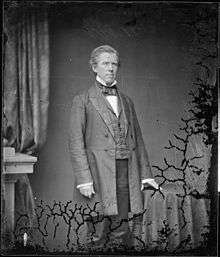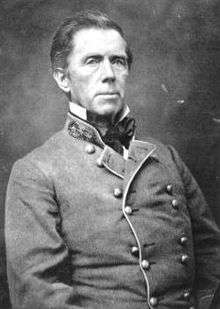William Smith (Virginia governor)
| William Smith | |
|---|---|
 | |
| Member of the Virginia House of Delegates from Fauquier County | |
|
In office 1876–1877 Alongside H.B. Kerrick | |
| 30th and 35th Governor of Virginia | |
|
In office January 1, 1864 – May 9, 1865 | |
| Lieutenant | Samuel Price |
| Preceded by | John Letcher |
| Succeeded by | Francis Harrison Pierpont |
|
In office January 1, 1846 – January 1, 1849 | |
| Preceded by | James McDowell |
| Succeeded by | John B. Floyd |
| Member of the U.S. House of Representatives from Virginia's 7th district | |
|
In office March 4, 1853 – March 3, 1861 | |
| Preceded by | Thomas H. Bayly |
| Succeeded by | Charles H. Upton |
| Member of the U.S. House of Representatives from Virginia's 13th district | |
|
In office December 6, 1841 – March 3, 1843 | |
| Preceded by | Linn Banks |
| Succeeded by | George W. Hopkins |
| Member of the Virginia Senate from Culpeper, Madison, Orange, Rappahannock and Greene Counties* | |
|
In office 1836–1840 | |
| Preceded by | Daniel F. Slaughter |
| Succeeded by | John Woolfolk |
| Personal details | |
| Born |
September 6, 1797 Marengo, King George County, Virginia |
| Died |
May 18, 1887 (aged 89) Warrenton, Virginia |
| Political party | Democratic |
| Spouse(s) | Elizabeth Bell |
| Profession | Politician, Lawyer |
| Military service | |
| Nickname(s) | "Extra Billy" |
| Allegiance |
|
| Service/branch |
|
| Years of service | 1861–1863 |
| Rank |
|
| Battles/wars |
American Civil War *Battle of Fairfax Court House (June 1861) *First Battle of Manassas *Battle of Seven Pines *Seven Days Battles *Second Battle of Manassas *Battle of Sharpsburg *Second Battle of Fredericksburg *Battle of Gettysburg |
| |
William "Extra Billy" Smith (September 6, 1797 – May 18, 1887) was a lawyer, congressman, the 30th and 35th Governor of Virginia, and a Major General in the Confederate States Army during the American Civil War. On his appointment in January 1863, at the age of 65, Smith was the oldest Confederate general to hold field command in the war.
Early life and politics
Smith was born in Marengo, King George County, Virginia. He attended private schools in Virginia and Plainfield Academy in Connecticut. He then studied law and was admitted to the bar and commenced practice in Culpeper, Culpeper County, Virginia, in 1818. Two years later, he married Elizabeth Hansbrough Bell. They would have eleven children, several of whom died in infancy or as young adults.
He established a line of United States mail and passenger post coaches through Virginia in 1827 and then expanded the business into the Carolinas and Georgia in 1831. It was in this role that he received his nickname. Given a contract by the administration of President Andrew Jackson to deliver mail between Washington, D.C., and Milledgeville, Georgia (then the state capital), Smith extended it with numerous spur routes, all generating extra fees. During an investigation of the Post Office department, Smith's extra fees were publicized by U.S. Senator Benjamin W. Leigh, and he became known as "Extra Billy" in both the North and South.
Smith served as a member of the Senate of Virginia from 1836 to 1841, when he resigned during his second term. Smith successfully contested as a Democrat the election of Linn Banks to the Twenty-seventh Congress and served from March 4, 1841, to March 3, 1843. He failed to be reelected in 1842 to the Twenty-eighth Congress. He then moved to Fauquier County.
Smith served during the Mexican-American War as Governor of Virginia from 1846 to 1849 and was an unsuccessful candidate for election to the United States Senate during that period. He moved to California in April 1849 and was president of the first Democratic State convention in 1850. He returned to Virginia in December 1852 and was elected to the Thirty-third Congress and to the three succeeding Congresses (March 4, 1853 – March 3, 1861).
His brother-in-law Peter Hansbrough Bell was a Texas Revolutionary and Mexican War veteran who served as the third Governor of Texas from 1849 through 1853.
Electoral history
- 1853; Smith was elected to the U.S. House of Representatives with 51.79% of the vote, defeating Whig Edgar Snowden.
- 1855; Smith was re-elected with 78.01% of the vote, defeating Independents P. Johnson Barbour and David Funsten.
- 1857; Smith was re-elected with 57.5% of the vote, defeating now-American Snowden.
- 1859; Smith was re-elected with 49.36% of the vote, defeating Independent Democrats Henry Wirtz Thomas and Henry Shackleford.
- 1863; Smith was elected Governor of Virginia with 47.77% of the vote, defeating fellow Conservative Democrats Thomas Stanhope Flournoy and George W. Munford.
Civil War
When Virginia seceded from the Union, Smith declined to accept a commission as a brigadier general because he rightly admitted he was "wholly ignorant of drill and tactics". A few weeks after the war started, he was present during a Union cavalry charge at the Battle of Fairfax Court House (June 1861). He took command of the Confederate troops after the death of their commander John Quincy Marr, and found he enjoyed the experience. He requested a commission and was appointed colonel of the 49th Virginia Infantry regiment just three days before the First Battle of Bull Run, where the regiment and new commander performed well.

Smith served in the Confederate Congress in 1862, but returned to the 49th Virginia at the start of the Peninsula Campaign. He was wounded at the Battle of Seven Pines and his regiment received favorable notice in his commander's report. During the Seven Days Battles the regiment was lightly engaged, but he and his command again were described as having "characteristic coolness" and "fearlessness." He was known for expressing contempt for West Point graduates ("West P'inters") and their formal tactics, recommending common sense to his men instead of a military education, and distinguished himself with his unorthodox field uniform, including a tall beaver hat and a blue cotton umbrella.
At the Battle of Antietam, Smith temporarily commanded a brigade in Maj. Gen. Jubal Early's division. He was wounded three times, but continued to command, and Maj. Gen. J.E.B. Stuart wrote that he was "conspicuously brave and self-possessed." By the end of the battle he had to be carried from the field. In recognition of his performance, he was promoted to brigadier general as of January 31, 1863. He commanded a brigade in the Battle of Chancellorsville, but achieved no distinction in this role.
By the time of the Gettysburg Campaign, Smith's superiors were leery of his performance, but had to maintain some degree of support, since he was the former governor and at the time the governor-elect of Virginia. Early directed Brig. Gen. John B. Gordon to keep close contact with Smith and effectively exercise a joint command over their two brigades. During the Battle of Gettysburg, Smith refused to pursue retreating Union XI Corps troops, concerned that a Union force was approaching from his left, which was a significant reason that the Confederates failed to attack and take Cemetery Hill on July 1, 1863. Smith was the oldest general on the field and fought (unsuccessfully) the oldest Union general, Brig. Gen. George S. Greene, at Culp's Hill on July 3, 1863. He was the only general not commended in Early's official report and, as a result, decided to resign his commission on July 10. He nevertheless received an essentially honorary promotion to major general and Assistant Inspector General on August 12 and performed recruiting duty in Virginia.
Postbellum career
Before the Gettysburg Campaign, Smith was elected again as Governor of Virginia and served from January 1, 1864, to the end of the war. He was among the first Southern governors to advocate arming blacks to provide manpower for the Confederacy, and he occasionally returned to the field to command troops in the defense of Richmond. He was removed from office and arrested on May 9, 1865, but was paroled on June 8.
He returned to his estate, "Monte Rosa," (Later renamed "Neptune Lodge") near Warrenton, Virginia, where he engaged in agricultural pursuits. At the age of eighty, he became a member of the Virginia House of Delegates (1877–79). He died in Warrenton and was buried in Hollywood Cemetery, Richmond, Virginia.
See also
References
- Eicher, John H., and David J. Eicher. Civil War High Commands. Stanford, CA: Stanford University Press, 2001. ISBN 0-8047-3641-3.
- Mingus, Scott L., Sr. Confederate General William "Extra Billy" Smith: From Virginia's Statehouse to Gettysburg Scapegoat. El Dorado Hills, CA: Savas Beatie, 2013. ISBN 978-1-61121-129-0.
- Sifakis, Stewart. Who Was Who in the Civil War. New York: Facts On File, 1988. ISBN 978-0-8160-1055-4.
- Tagg, Larry. The Generals of Gettysburg. Campbell, CA: Savas Publishing, 1998. ISBN 1-882810-30-9.
- Sifakis, Stewart. Who Was Who in the Civil War. New York: Facts On File, 1988. ISBN 978-0-8160-1055-4.
- Warner, Ezra J. Generals in Gray: Lives of the Confederate Commanders. Baton Rouge: Louisiana State University Press, 1959. ISBN 978-0-8071-0823-9.
 This article incorporates public domain material from the Biographical Directory of the United States Congress website http://bioguide.congress.gov.
This article incorporates public domain material from the Biographical Directory of the United States Congress website http://bioguide.congress.gov.
External links
- A Guide to the Executive Papers of Governor William Smith, 1846-1848 at The Library of Virginia
- A Guide to the Executive Papers of Governor William Smith, 1864-1865 at The Library of Virginia
| United States House of Representatives | ||
|---|---|---|
| Preceded by Linn Banks |
Member of the U.S. House of Representatives from Virginia's 13th congressional district 1841–1843 |
Succeeded by George W. Hopkins |
| Preceded by Thomas H. Bayly |
Member of the U.S. House of Representatives from Virginia's 7th congressional district 1853–1861 |
Succeeded by Charles H. Upton |
| Political offices | ||
| Preceded by James McDowell |
Governor of Virginia 1846–1849 |
Succeeded by John B. Floyd |
| Preceded by John Letcher |
Governor of Virginia 1864–1865 |
Succeeded by Francis H. Pierpont Unionist Governor |
